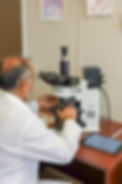
The Maritime Brain Tissue Bank collects brain tissues to make them available for researchers around the world who are trying to better understand the causes of dementia and other neurological disease.
The Maritime Brain Tissue Bank is located in the Tupper Medical Building, Faculty of Medicine, Dalhousie University. It was established in 1993 with help from the Alzheimer Society of Nova Scotia, Dalhousie University, and Nova Scotia Health.

brain donation
shapes the future
Brain research is a rapidly developing field that has the potential to unlock the mysteries of the human brain and help us find cures for diseases that have no known treatment. With the rising cases of neurological conditions with unclear causes, it is increasingly important to have access to human tissue samples that can help scientists study the brain.
Without the generous contributions of brain donors, researchers would not be able to make the progress they have made in understanding the complexities of the brain. Brain donation not only has the potential to unlock new diagnostic techniques, cures and treatments, but it can also bring comfort to those affected by neurological conditions, knowing that their contribution can lead to a better understanding of the brain and its diseases.
medical brain autopsy with
donation for research
In life, doctors diagnose dementia by recognizing symptoms, such as memory loss, that are identified by patients and their families. However, the only way to confirm the diagnosis and determine the cause of dementia with certainty is through a medical brain autopsy after death.
A medical brain autopsy is a procedure completed at a hospital. Following the autopsy, a doctor at the hospital will carefully examine brain tissue under the microscope and look for signs of disease. In this way, a medical brain autopsy is important to help us determine the cause(s) of dementia.
However, an autopsy only requires a small portion of brain tissue. This means families can also donate tissue for research. Through research, we hope to understand the disease processes and their causes to help us find more effective diagnostics and treatments in the future, and ultimately a cure.
